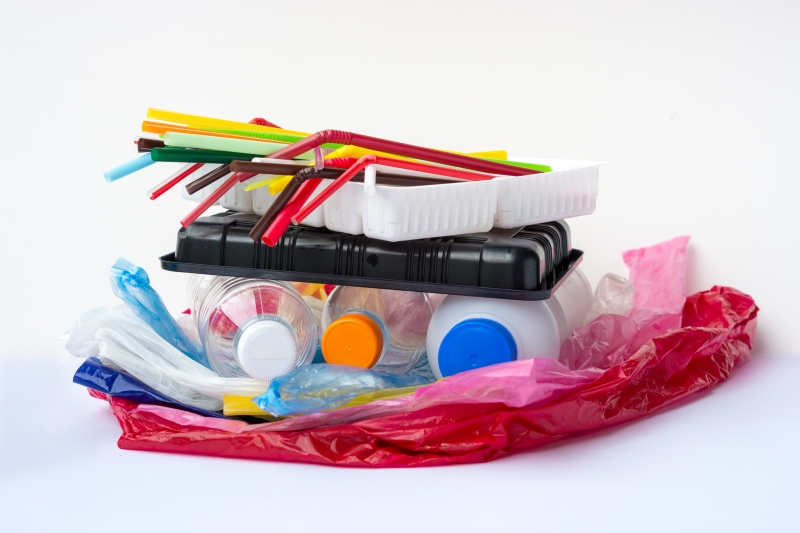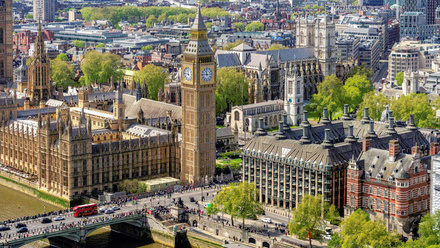Taking on the single-use mindset
The significant impact of single-use plastic has sparked international conversation and legislation to follow suit. Sarah Morgan reports on the current thinking from a UK Westminster Forum event.

'We want plastics packaging to be reusable, recyclable or compostable,' Claire Shrewsbury, Director of Insights and Innovation at WRAP, led confidently at a recent Westminster Forum event on single-use plastics.
'We want a very high 70% effective recycling rate. And we want, on average, our [Plastic Pact] members to have 30% recycled content,' she asserted. The latter has now been mandated in the UK with the Plastic Packaging Tax. It is charged at £200/t and applies to plastic packaging produced in, or imported into, the UK, that contains less than 30% recycled content.
Shewsbury also shared some good news, saying, 'We have moved the dial in that now 50% of plastics packaging is recycled [in the UK], up from 44% in 2018”. She continued, “If you walk into a supermarket now, you know PVC [usage] has reduced by 80%.'
Since WRAP worked with the Ellen MacArthur Foundation to launch the first Plastics Pact in the UK, they have gone on to jointly launch and support a number of these pacts in Europe, India, Kenya, South Africa and the US. They have also been working with the World Economic Forum under the Global Plastics Action Partnership, to introduce national partnerships in Indonesia, Vietnam, Pakistan, India, Nigeria, Ghana, Ecuador, South Africa and Mexico.
Shrewsbury noted how the organisations have joined forces to 'drive forward global action on plastics through greater knowledge exchange'. The aim is to also eliminate unnecessary use of the materials.
Shrewsbury continued, 'The UK Plastics Pact has committed to a number of key activities to deliver against reuse by 2025...In order to do this, we’ve put a roadmap together…the real aim is that each member, retailer and brand has commercialised at least two reusable packaging systems by 2025.'
They are also taking a minimal approach to packaging.
'We are encouraging retailers to actually sell…fresh fruit and veg loose, and this is actually off the back of research that we did, that we know the packaging isn’t [always] helping to prevent food waste and extending life.'
She was pleased to say, 'all of the major retailers have committed to removing date labels and best before labels'.
She continued, the Plastics Pact is 'a really large project. And what we [also] want to do with the project is really to understand how best to collect film from the kerbside, how much that will cost, how it can be handled, so it is ultimately sorted and then recycled.'
Confusion or clarity?
Then there is also the upcoming single-use plastics ban in the UK. From 1 October 2023, businesses must no longer supply, sell or offer single-use plastic plates, trays and bowls to the public in England. The ban on these items will include:
- Online and over-the-counter sales and supply
- Items from new and existing stock
- All types of single-use plastic, including biodegradable, compostable and recycled
- Items wholly or partly made from plastic, including coating or lining
Martin Kersh, Director of the Foodservice Packaging Association, highlighted confusion around this. 'Now one of the issues we’re facing is that businesses and the public…think those three items – plates, bowls and trays – are banned everywhere. And this has created huge chaos. There is guidance, draft guidance…that makes it clear those items I’ve mentioned may only be sold to the trade and not to the public…This is raising huge confusion, raising lots of questions.'
He is also concerned about the exemption for reusable packaging both from the Plastics Packaging Tax and single-use ban. 'One of the things I have detected, and hate, is producers increasing the weight of these items, and then relabelling them as reusable…And if you do that, you avoid the ban, avoid them being taxed. So we’ve asked DEFRA [Department for Environment, Food & Rural Affairs] and HMRC [HM Revenue & Customs] to provide definitions of reusable as ‘refillable’.
He also had a bone to pick with DEFRA on timelines. 'One of the things I cannot stand is these variations to the Internal Market Act – my members want to trade freely across the UK.' A major hurdle in this, he says, is lack of guidance and DEFRA not communicating with these independent retailers. 'We’re now talking about [this coming into place on] 1st October – the guidance should have been agreed and in place in January of this year.'
He called for proper due process, assessment and the correct procedures for implementing the bans. He stated boldly, 'Because funnily enough, whenever it comes to items being banned, the alternatives are more expensive.'
Maurice Golden MSP also raised concerns that the Plastics Packaging Tax is 'a pretty blunt instrument'.
And part of the challenge is the current cost-of-living crisis. Golden said, 'We don’t want to be trying to get people to potentially do the right thing environmentally by buying loose, yet it’s costing them more money.'
He also noted market volatility. 'Currently, they use a system called the Packaging Waste Recovery Notes, or PRNs…But it’s a market-based system. So, it goes up and down all the time.'
This was combined with issues around Extended Producer Responsibility legislation timelines. 'So there is a certain degree of uncertainty about what’s going to happen…And that’s critical if you’re a plastic recycler who needs to invest £10mln, £20mln…because if the legislation doesn’t come in on time, you can’t plan. So, it is absolutely critical that the markets are given certainty around some of these key issues'.
In terms of the teeth for the single-use plastic legislation, Golden stated, 'While breaches of the proposed regulations will be criminal offenses with a maximum penalty and unlimited fine, most enforcement is likely to be through civil sanctions, of which there are four main types.
'First of all, there are fixed monetary penalties of up to £200…Secondly, compliance notices can be used to require suppliers to take specified steps within a specified period to secure that an offense doesn’t continue or recur. Thirdly, stop notices can prohibit carrying on an activity until steps specified in the notice are taken. And lastly, enforcement undertakings are a written undertaking by business to take action within a specified period.' If these are breached, a criminal prosecution can also be brought.
Steve Fletcher, Director of Revolution Plastics at the University of Portsmouth, UK, was meanwhile conscious of the international picture, 'We also know when we look internationally that policies that are in place to tackle plastic pollution in one country don’t have the reach and the power to really cover the entire plastics lifecycle.' Quite often, he reflected, the pollution leaks out of the value chain in areas where the rules are less strict.
On a positive note, Chris Forbes, Cheeky Panda Co-Founder, says of public pressure, 'There’s a balance between the pressure that can come from the public side of things, and actually then the demand is changing within the manufacturing private sector so that the two can dovetail quite nicely together'.
Barbara Bell, Environmental Taxation Director, KPMG, continued, '[The Tax] forces businesses to look at the plastic in their supply chain. It’s not a single-use tax…It’s actually a tax that ensures that material, plastic packaging components that contain less than 30% recycled material, are taxable.'
She noted, 'Even if we had remained within the EU, there is no overall EU directive-led Plastic Packaging Tax.'
Bell is concerned, however, 'What is really lacking are incentives to change behaviour…It’s about the cost of compliance, which far outweighs I think the cost of the Tax for many businesses'.
Scaling up
Nick Cliffe, Deputy Challenge Director of Innovate UK, sees the Tax as an innovation driver, 'The Plastic Packaging Tax has really driven interest in investment, particularly in the food-grade recycling approaches.'
He added, 'Over 60% of the budget that we were allocated, has been earmarked for large and late-scale demonstration projects, really trying to prove that some of the technology that the UK has developed over the last few years is commercially viable at scale. Nothing hurts innovation more than not being able to fund that first commercial application…So by offsetting the cost of these large-scale demonstrators, we’re really hoping that we will be able to embed and allow this amazing UK innovation to grow and succeed.'
He expanded, 'We’re seeing lots of innovation in reuse and refill, both business models targeting it, supply chain innovation, data and information systems all aimed at facilitating making reuse and refill as easy as the single-use alternatives wherever it’s practicable. And lastly, another area of UK strength is around the data product tagging and labelling machine vision and artificial intelligence. We’re really just at the cusp of unlocking what that might be able to do to help us do packaging better.'
Catherine Conway, the founder of Unpackaged, speaking about the Refill Coalition, said the current challenge that lots of retailers and brands are facing now is all of these trials are really small, single-store, single-brand and they can’t scale. Meaning they can’t build a business case. 'But this is where we absolutely 100% need supportive regulation. That means that the whole industry can move forward towards reuse…Nobody wins if only one player moves in the market.'
Cliffe continued, 'We’ve got a wide suite of materials, now we need to translate them into stuff that can be bought by brands as simply as they can buy the current petrochemical versions available.'
Issues remain about compostables, he said. 'We’re really hopeful that the Compostable Coalition project is generating data that suggests how these materials could be collected, how these materials could be compatible with the available technology and future potential technologies in the UK.'
Amanda Padfield, Chief Technical Development and Innovation Officer at SUEZ Recycling and Recovery UK, reflected on the new plastic alternatives on the market. 'But unfortunately, at the moment, in the short term, some of those, such as the compostable packaging, is just ending up in the residue, it can’t be dealt with...Similarly, some of the alternatives that have been put forward, some of the composites are really difficult to recycle. And sometimes it’s more difficult than the original materials.'
Steve Morgan notes a positive, 'What’s recycled in the UK has traditionally been about 60% [with 40%] exported…, but that’s flipped now in the last year or two. So actually more is recycled in the UK than has been exported'.
He noted, however, the 30% recycled content requirement for the Plastic Packaging Tax means 430,000t recycling capacity is needed to meet that target. The reprocessing throughput at 288,000t 'is quite a way short. And of course, if we are actually to handle the material in the UK itself, without exporting it, we are quite a way off'.
Gareth Morton, Ecosurety, added, 'Artificial Intelligence is getting cleverer and cleverer in the sorting industry. But it will be a challenge, no doubt about it.'
Golden noted the lack of consistent waste collections across the UK, England, or even regions. Something he sees as a big hurdle.
Morton, meanwhile, commented on the HMRC’s role in potentially enabling chemical recycling as important.
Professor Rachel Rothman, Academic Lead for Sustainability at the University of Sheffield, UK, continued the discussion around infrastructure constaints, 'We should be recycling mechanically everything we can. That requires investment, we do not have enough infrastructure in the UK to do as much mechanical recycling as we will ultimately need to do.'
She noted chemical recycling is great for plastics that cannot be mechanically recycled, but 'we don’t have the infrastructure, there’s not enough understanding about how it will fit into the system at the minute and some work needs to be done'.
Golden was clear, 'DEFRA should be having an urgent rethink of what the Deposit Return Scheme [for drinks containers] looks like to try and work out the possibilities of going back and bringing reuse as part of it'.
His closing thoughts were, 'If you are aiming to get money out of such a system, you will lose…If you see it as something we do for our environment…and our children to have a better world, then that’s the right set-up.'







